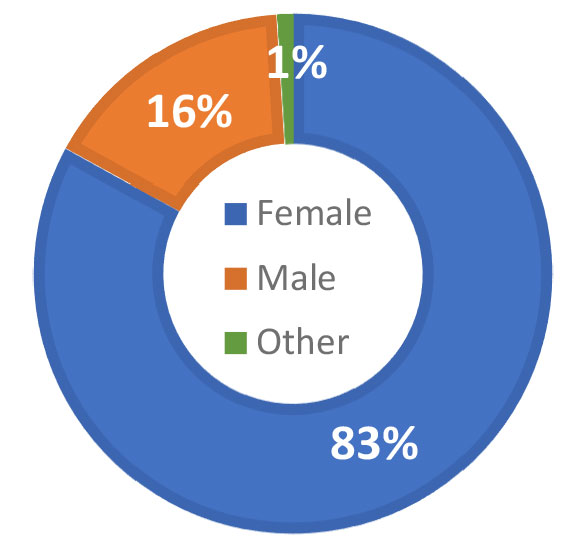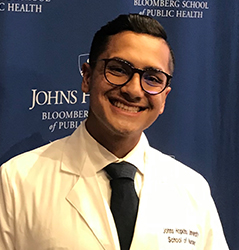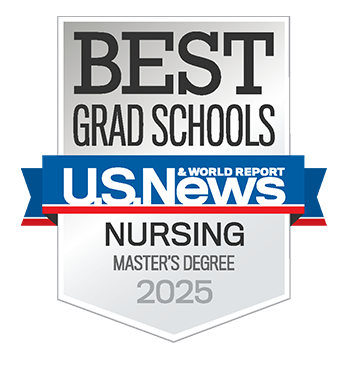Master of Science in Nursing (MSN): Entry into Nursing Program
Need your questions answered?
OVERVIEW
Jumpstart Your Career
Students with a bachelor’s degree in another discipline who want to pursue a nursing career can enroll in a full-time graduate program to earn a Master of Science in Nursing (MSN). Unlike traditional programs, the MSN Entry into Nursing program emphasizes leadership, global impact, quality and safety, and evidence-based interprofessional education. You will learn from a framework that integrates the humanities, public health, genetics, and physical and organizational sciences into nursing practice.
Graduates will receive enhanced bedside nursing education and training and the necessary tools to advance into a leadership role or continue toward a doctoral degree. They will be prepared to take the nursing licensure exam (NCLEX) and be licensed as an RN. Students will have opportunities to explore their areas of interest, including global health, research, quality and safety, and practice in many specialty areas.
“We’re trying to prepare practice-ready nurses for as many diverse nursing roles as possible.” Robert Atkins, PhD, RN, FAAN
Robert Atkins, PhD, RN, FAAN
INside, OUTside
The future of nursing is IN homes and schools, OUTpatient settings and INpatient acute care. At the Johns Hopkins School of Nursing, we’re empowering nurses to meet patients where they are, drive health equity across all settings, and champion the shift toward whole-person, community-based care.
Program Details
Tuition & Fees
Estimated Tuition Cost: $1,995 per credit See Cost of Attendance Details
Financial Aid: There are numerous options for financing your education including grants, scholarships, federal loans, and employment programs. Learn more.
Upcoming Application Deadlines
Fall entry: Nov 1, Jan 15
Spring entry: Jul 1, Oct 1
Inside the Outside Track
Students in this track are the first in the nation to become nurses through clinicals that takes place entirely outside of the hospital setting. A small number of students interested in community health gain hands-on experience in outpatient settings like community health centers and aging facilities, working one-on-one with preceptors. This approach prepares students for diverse roles outside of hospital settings, equipping them with skills in patient care, medication administration, and injections. Community partners value these graduates, who are ready for outpatient roles prioritizing holistic, patient-centered care.
Requirements
Admission Criteria
Bachelor’s Degree (in a discipline other than nursing) from a regionally accredited college or university or an equivalent degree from a comparable foreign institution
Scholastic GPA of at least 3.0 on a 4.0 scale from an accredited college or university
3 Letters of Recommendation (2 academic and 1 professional)*
Official Transcripts (from all previous colleges/universities)
GRE scores are accepted but not required
One written essay
Virtual Interview/Video Essay
Current Resume
TOEFL or IELTS if English is not your native language
Information for applicants with international education
*References should be recent, written for the purpose of your application to this program and from professors who know you as a student or employers who know you as a professional in a job setting preferably in a supervisory role. Personal references from colleagues, friends, or family members do not meet the requirement.
Prerequisites
In addition to a bachelor’s degree in a non-nursing field, applicants must complete 17-21 credits (grade B- or better) of prerequisite coursework from a regionally accredited college or university.. Students who have not taken their prerequisites can take them all online at Hopkins Nursing.
Applicants can be working on prerequisite coursework while applying to the program. Coursework must be completed and final transcripts submitted prior to starting the Master’s Entry program.
Anatomy with lab (3-4 credits)
Human Growth and Development Through the Lifespan (3 credits)
Microbiology with lab (3-4 credits)
Nutrition (2-3 credits)
Physiology with lab (3-4 credits)
Statistics1 (3 credits)
U.S. immigration regulations require that students needing an F-1 visa must successfully fulfill all prerequisites before an I-20 can be issued. To allow sufficient time to complete all the steps in the visa process, students must submit an official transcript or official course by course evaluation with final grades (B- or higher) for all prerequisite courses to the Office of Admissions at least 3 months prior to the beginning of the term in which they wish to begin studies (October for spring term; May for fall term).
1 Topics should include correlation and linear regression; experimental design such as t-tests, analysis of variance and chi-square; suggested departments: psychology, sociology, education, biology, and mathematics. Statistics courses offered by business, management, and economics departments are typically more theory-based and lack the experimental design component.
MSN Entry profile based on Fall 23 cohort
30%
Underrepresented Minority

83% Female/16% Male/1% Other
29%
First Generation
20
Countries Represented
29
States Represented
25
Average Age
90%
Received Scholarship Support
Curriculum
Professionalism for Nursing in Health Care (3)
Foundations of Nursing Practice (3)
Integrated Clinical Management: Common Health Alterations (4)
Health Assessment I (3)
Pathophysiology I (3)
Community Outreach to Underserved Communities in Urban Baltimore (1)
Integrated Clinical Management: Chronic Health Alterations (4)
Pharmacology (3)
Biostatistics for Evidence-Based Practice (3)
Promoting Health in Older Adults (3)
Health Promotion and Risk Reduction Across the Lifespan (2)*
*This course is offered in Fall semester for cohorts that begin in Spring.
Integrated Clinical Management: Complex Health Alterations (4)
Leadership for Professional Nursing (3)
Psychiatric Mental Health (3)
The Research Process and its Application to Evidence-Based Practice (3)
Nursing the Childbearing Family (4)
Child Health (4)
Population and Public Health Nursing (4)
Philosophical, Theoretical and Ethical Perspectives of Advanced Nursing Practice (3)
Context of Health Care for Advanced Nursing Practice (3)
Integrated Clinical Management: Synthesis Practicum (6)
Nursing Specialty Elective(s) (at least 3 credits)
* Transfer Credits from the JHSON MSN (Entry into Nursing) Program to the DNP Advanced Practice Track can vary based on current curriculum & start date.
** Up to 15 credits may be applied from the JHSON MSN Entry into Nursing Program to the PhD Program.
“My personal ambition of doing more than what is expected leads me to pursue a program that encourages its future nurses to challenge themselves in providing the highest quality of care on a global level.” Kash Calderon
Kash Calderon
Engage with Us
Join us soon for a tour, on-campus event or a virtual visit.
Request Information
Speak with Admissions to learn more about our programs.
Virtual Info Sessions
See recordings of some of our recent virtual info sessions.
Tuition & Other Costs
Financial aid
View the costs for the Master of Science in Nursing (MSN) Entry into Nursing Program.
MSN Entry into Nursing (Fall 2024 start)
MSN Entry into Nursing (Spring 2025 start)
MSN Entry into Nursing (Fall 2025 start)
MSN Entry into Nursing (Spring 2026 start)
Scholarships & Grants: Grants are awards based on financial need that do not have to be repaid. Many students also benefit from scholarships and awards based on merit. Learn more.
Loans: Many students will avail themselves of loans to help finance their School of Nursing education. If necessary, we encourage you to borrow only what is absolutely essential to cover your educational costs. Learn more.
Employment: Many students locate part-time employment to help pay education expenses. Numerous positions are available on campus and within various community based organizations. These jobs provide students with opportunities to gain practical work experience. Most positions are funded through the Federal Work-Study Program. Learn more.
Frequently Asked Questions
With your MSN degree in hand, you will be able to sit for the NCLEX. Once you obtain your RN licensure, you can continue your studies in advanced nursing practice or begin employment as a RN.
In addition to obtaining your master’s degree, the MSN Entry into Nursing program provides the opportunity for a greater role and position flexibility in healthcare settings while allowing you to quickly move up the career ladder. This program will provide you with the skills and academic readiness to pursue an advanced nursing degree.
No. This program is accelerated and requires a full time, on-site commitment.
Yes! The school has several financial assistance programs that may include scholarships, grants, work-study, and loans.
GRE scores are accepted but not required for the MSN (Entry into Nursing) Program.
Students become eligible to take the NCLEX after they complete their selected program in its entirety.
The JHUSON offers two doctoral programs for those interested in continuing their nursing education.
• The Doctor of Philosophy (PhD) program prepares nurse scholars to develop and conduct scientific research that advances nursing practice, healthcare, and health. The PhD Program will accept up to 15 credits to be transferred into the PhD program directly from the JHUSON MSN Entry into Nursing program.
• The Doctor of Nursing Practice (DNP) program prepares nurses at the highest level of professional nursing practice for advanced roles as clinical and healthcare policy leaders. The DNP Program will accept up to three courses to be transferred into the DNP Advanced Practice Track directly from the JHUSON MSN Entry into Nursing program.
Incoming MSN Entry into Nursing classes are divided into sections of approximately 60 students for lecture classes. The ratio for clinical is one instructor to six or seven students, and for labs, slightly smaller.
Most clinical sites are in Baltimore and the surrounding areas (within an hour drive from campus). Current clinical sites include: The Johns Hopkins Hospital, Johns Hopkins at Bayview, Franklin Square, Mercy Medical Center, Sinai Hospital, Union Memorial, Holy Cross in Bethesda, MD, among many others.
For your first semester, you will be assigned a clinical placement. After your first semester you are able to identify which clinical sites you prefer, however there is no guarantee that you will receive your top preference as groups are small and consist of 6-8 students.
We expect all students to have reliable transportation to all assigned clinical sites. Clinical site locations could be up to one-hour from the School of Nursing.
It is recommended that prerequisite coursework be completed within the last five years, but it is not a requirement.
You are not required to have the prerequisites completed at the time you submit your application. However, they must be completed by the time the program starts. The Admissions Committee can accept someone who still has courses pending with the condition that they complete all pending courses with a B- or better.
U.S. immigration regulations require that students needing an F-1 visa must successfully fulfill all prerequisites before an I-20 can be issued. To allow sufficient time to complete all the steps in the visa process, students must submit an official transcript or official course by course evaluation with final grades (B- or higher) for all prerequisite courses to the Office of Admissions at least 3 months prior to the beginning of the term in which they wish to begin studies (October for spring term; May for fall term).
Similar to an in-person interview, you’ll be asked a series of 3 questions throughout the assessment. One question will come from each of three main themes: Motivation, Teamwork, and Cultural Humility. The process is simple. You will be asked a question, given prep time (60 seconds), and a set amount of time to respond (90 seconds). This assessment will be completed in one sitting and should only take 20 minutes to complete and can be done on your own time. Remember, be yourself. We appreciate and value your natural, authentic, honest responses. Feel free to check out our Admissions Workshops webpage for additional tips for submitting your application.
